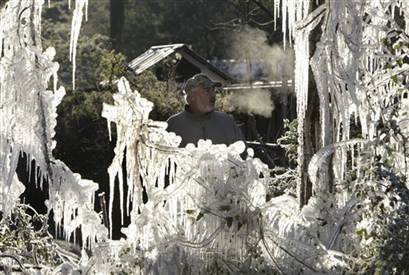It's not looking good down there. It was still colder last night. Polk county is the heart of the Florida citrus belt.
http://www.theledger.com/article/20100110/NEWS/1105064/1410?Title=Temps-Dip-Deep-Into-20s-Overnight
Temps Dip Deep Into 20s Overnight
Fla. Businesses Feeling Bite of Record Cold
By Kevin Bouffard
The Ledger
Published: Sunday, January 10, 2010 at 10:32 p.m.
Last Modified: Sunday, January 10, 2010 at 10:32 p.m.
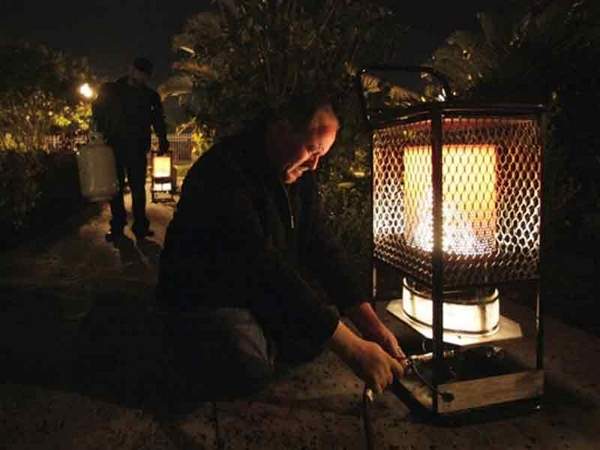 PIERRE DUCHARME | THE LEDGER
PIERRE DUCHARME | THE LEDGER
Stacy Smith, park foreman, foreground, and Kevin Polk, groundskeeper, check propane heaters at Hollis
Gardens in Lakeland late Saturday night. Smith said the heaters were being used to try to protect
plants in the tropical section.
LAKELAND | Temperatures hit the mid-20s overnight in many parts of Polk County, likely causing more damage to already hard-hit fish farmers and other agriculture businesses.
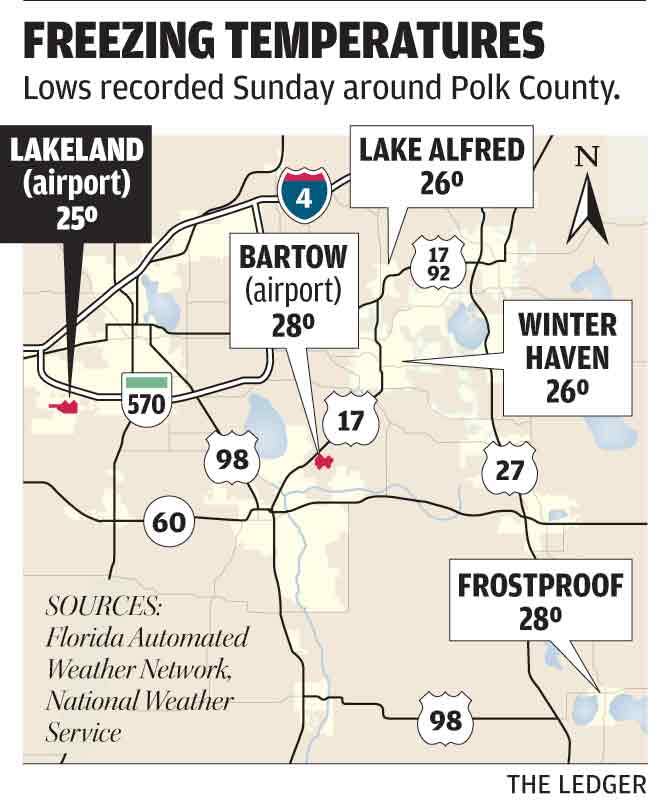
Just before dawn, BayNews 9 was reporting 23 degrees in Mulberry and 24 in Lakeland and Winter Haven.
The National Weather Service was reported 27 a.m. at 7:15 a.m. at Lakeland Linder Regional Airport in Lakeland and Bartow Municipal Airport and 28 degrees at Gilbert Field in Winter Haven.
Forecaster are predicting highs in the 50s this afternoon and another freeze, with temperatures again dipping into the 20s tonight.
Power useage has been high, and Lakeland Electric had warned some customers there could be intermittent outtages. As of 7:15 a.m. today, one resident reported power was out in a neighborhood west of South Florida Avenue near Beacon Road just south of downtown Lakeland.
By Sunday, the week-long siege of overnight freezing weather had already wiped out more than half of Florida's tropical fish stocks with likely more damage to come.
Florida's citrus farmers could become the next to feel the pain as a widespread citrus freeze -- 28 degrees or lower for at least 4 hours -- appeared to have happened overnight.
And Florida strawberry growers centered around Plant City will be nervously eyeing their plants over the next couple weeks for signs of water damage after dumping unprecedented amounts of water in their fields during the Arctic cold spell to protect the fruit from damage.
Even if the plants escape damage, a strawberry shortage in February appears likely because the strawberry plants have lost more than a week of growing time as result of the past week's freezing weather. Under normal weather conditions, a strawberry plant takes about four weeks for to produce a mature berry from the new bloom.
Temperatures fell to a low of 25 degrees in Lakeland on Sunday, matching a 1970 record, and to 26 in Winter Haven, also matching the 1970 record for the date, said John McMichael, a meteorologist with the National Weather Service in Ruskin. The unofficial low in Bartow was 28 degrees.
"In almost 30 years in the business, this is the worst I've seen it," said Marty Tanner, owner of Aquatica Tropicals Inc., which has about 200 tropical fish ponds, each with about 20,000 fish, at farms in Lakeland and Plant City.
"I've written off 100 ponds in North Lakeland. There are no live fish there," he said on Sunday. "Last night was the straw that broke the camel's back."
The fish become vulnerable once pond temperatures fall below 55 degrees. In freezing weather, water temperatures can be kept up by refreshing the ponds with well water, which is around 68 degrees, and by covering them with plastic sheets, which keep out the cold air and create a greenhouse warming effect if the sun shines during the day.
The latter was ineffective after Saturday's wind and overcast skies, Tanner said. There was no sun, and the wind got under the sheets and blew out what warm air remained.
When freezing temperatures returned Sunday morning, there was no residual heat left, Tanner said, and temperatures plunged to the 40s even in the covered ponds, lower in the uncovered ones.
"We have hardly any fish that will survive below 50," he said.
WIDESPREAD DAMAGE
Michael Drawdy of Imperial Tropicals in Lakeland, which has 400 ponds, reported a similar experience, as did other fish farmers across the state, he said.
"I talked to people in Tampa, Kissimmee and the East Coast. With the temperatures we got last night, everybody's in the same boat, if not worse," Drawdy said.
Drawdy estimated 50 percent to 60 percent losses as of Sunday. Both fish farmers estimated losses would top 70 percent by today with more fish deaths in subsequent weeks as even fish that survived immediately will be too weak to live long.
"The losses could already be there, and we haven't seen them yet," Tanner said.
Drawdy and Tanner said they have enough savings to rebuild, but they wondered how many other farmers could if they have to rely on today's tight credit markets.
For citrus growers, temperatures in the southern part of the Florida citrus belt were much warmer than had been feared earlier, and the industry appears to have avoided a major freeze as of Sunday.
"There's a lot of ice everywhere, but so far it looks like we escaped damage," said Will Putnam of Putnam Groves Inc. in Bartow, from a 20-acre grove in Alturas on Sunday morning.
The family company, which includes U.S. Rep. Adam Putnam, R-Bartow, has more than 900 grove acres in Polk County.
The ice arose because Putnam and many other growers ran their ground irrigation sprinklers Sunday morning as a freeze protection measure. Ice forming at the bottom of the trunk releases heat, which rises through the canopy and protects the fruit.
Groves in low-lying pockets in every area of the state's citrus belt experienced a citrus freeze Sunday morning, said Andrew Meadows, a spokesman for Florida Citrus Mutual in Lakeland, the state's largest growers' representative.
In general, however, groves north of Interstate 4 were hit the hardest while temperatures stayed warmer farther south of I-4.
"I spoke with several growers in the area," said Mongi Zekri, an agriculture extension agent with the University of Florida in Hendry County. "Most of them did not turn on their irrigation systems. None of them found ice in the fruit. The minimum temperatures ranged from 28 to 33 in Southwest Florida.''
Reports from colleagues nearer I-4 were not as good, he said.
WORST TO THE NORTH
"There was ice in the fruit, which is bad news. They are also expecting tree damage as well," Zekri said. "In the Pasco and Hernando citrus area, it got to 23 and 24 degrees. The temperature was below 28 for more than 10 hours. It got to the mid-20s in Lake County with more than 10 hours below 28 for most locations. The fruit was frozen, too."
Harry Falk, a vice president at Heller Bros. Packing Corp. in Winter Garden, which also owns groves, reported temperatures below 28 degrees for six hours on about 200 acres north of I-4. It fell as low as 24 degrees in some areas.
In some groves, late-season Valencia oranges froze only partially, Falk said. In others, the Valencias froze solid.
But groves in the Fort Pierce and Immokalee areas saw no freezing, he said.
Freeze damage may be worse and more widespread when growers wake up today.
The National Weather Service forecast for Florida as far south as Glades and Hendry counties calls for temperatures below 27 degrees for at least three hours, meteorologist McMichael said. Growers in Polk, Hardee, DeSoto and Highlands could see temperatures plunge to 23 degrees for two hours or more.
Like citrus growers, strawberry growers run their irrigation systems to form ice, releasing heat that protects the fruit. Unlike citrus, the damage point for strawberries is 32 degrees. That has forced growers to run irrigation every night for more than a week.
WORST IN DECADES
"I've never seen this many consecutive freezing nights," said Carl Grooms, a Plant City grower for 36 years.
Grooms and Mike Lott, a Seffner strawberry grower, said nobody knows the long-term effect of putting so much water on their crop over a sustained period of time. Freezes normally come over one or two nights - three at most in rare instances such as Christmas 1989.
"This isn't good. We have to put all of it in the Good Lord's hands," Lott said. "Never has it been this long."
Root damage is one possibility if too much water remains in the ground, Grooms and Lott said. It could lower the amount of the soil's nutrients.
"This is a learning experience for the growers," Grooms said, who said it could take a couple weeks for the strawberry plant to show the damage.
The forecast calls for a final night of freezing weather tonight, forcing some strawberry growers to run water for a 10th straight night.
The extended cold weather has driven the homeless to seek shelter.
SHELTERS PACKED
Lighthouse Ministries, one of Lakeland's homeless shelters, was already exceeding its bed capacity Sunday afternoon for the second day. The shelter's 65 beds were already accounted for and another 17 people were expected to sleep on the floor Sunday night.
On Saturday, the shelter had similar numbers with 65 full beds and 15 people sleeping on the floor, said Steve Turbeville, Lighthouse Ministries' executive director.
"We've pretty well shut it down for tonight," he said Sunday afternoon. "But we will make exceptions on a case-by-case basis."
The shelter was handing out blankets and warm clothes to people who needed them to weather the cold streak. And donations to the shelter have been plentiful.
"The people have been real good in getting us the blankets and coats,'' he said. "We're staying on par with that."
[ Kevin Bouffard can be reached at kevin.bouffard@theledger.com or at 863-422-6800. ]
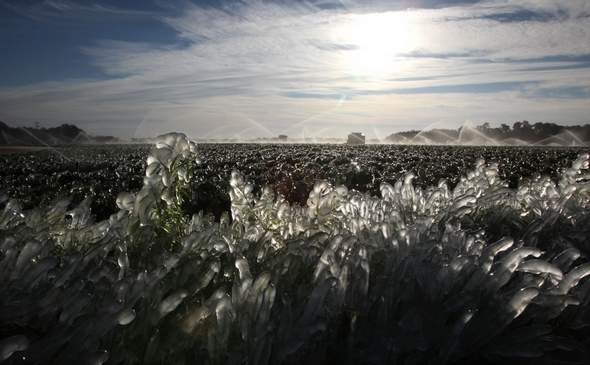 Photo Credit: CALVIN KNIGHT | THE LEDGER
Photo Credit: CALVIN KNIGHT | THE LEDGER
Ice covered weeds on a ditch boarding the Fancy Farms Strawberry Farms becomes a decorative
boarder as sprinklers cover the strawberry field with water turning to ice to protect the plants
on County line Rd east of Lakeland, Fl. Sunday morning. With tempatures dropping in the mid
twenteys water is sprayed on the plants act as a protective barrier keeping the plants at
32 degrees.
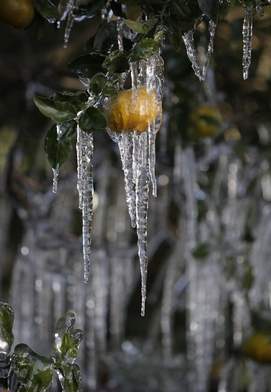 Photo Credit: PIERRE DUCHARME | The Ledger
Photo Credit: PIERRE DUCHARME | The Ledger
Orange covered with ice in one of the Peace Valley
groves after temperatures went down to the mid 20's
around Alturas, Florida.
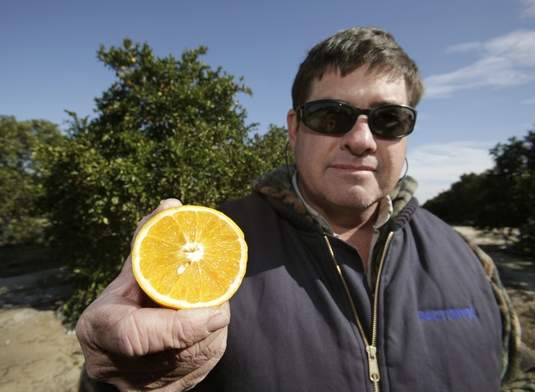 Photo Credit: PIERRE DUCHARME | The Ledger
Photo Credit: PIERRE DUCHARME | The Ledger
Will Putnam holds orange that did not freeze in one of the families groves after temperatures
went down to the mid 20's in spots around Alturas, Florida Sunday January 10th.
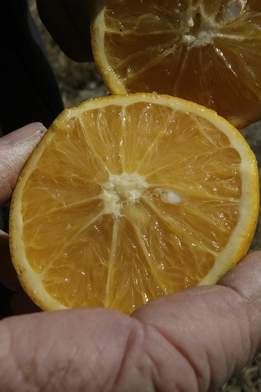 Photo Credit: PIERRE DUCHARME | The Ledger
Photo Credit: PIERRE DUCHARME | The Ledger
Will Putnam checks orange in one of the families
groves after temperatures went down to the
mid 20's around Alturas, Florida
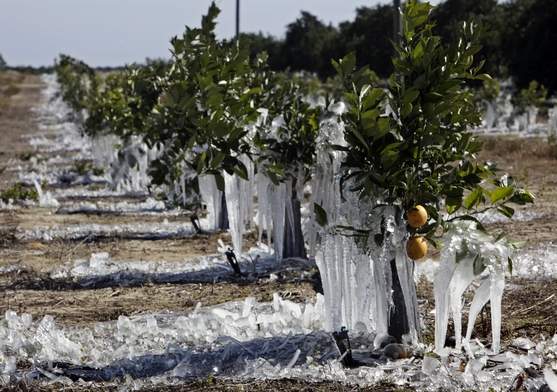 Photo Credit: PIERRE DUCHARME | The Ledger
Photo Credit: PIERRE DUCHARME | The Ledger
A small block of oranges covered with ice after temperatures went down to the mid 20's around
Alturas, Florida January 10, 2010.
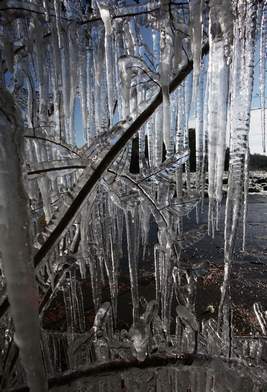 Photo Credit: CALVIN KNIGHT | THE LEDGER
Photo Credit: CALVIN KNIGHT | THE LEDGER
Icicles hang on a small tree and barbed wire
fence boardering a nursery off English Rd
east of Plant City Fl . Sunday morning. Grove
and Nursery workers sprayed water over plant
to protect them a covering of ice.
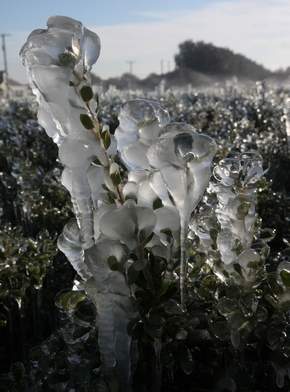 Photo Credit: CALVIN KNIGHT | THE LEDGER
Photo Credit: CALVIN KNIGHT | THE LEDGER
Ice covers a small shrub as a protective coating at
Harrell's Nursery off County line Rd east of Lakeland,
Fl. Sunday morning. With tempatures dropping in the
mid twenteys water is sprayed on the plants act as a
protective barrier keeping the plants at 32 degrees.
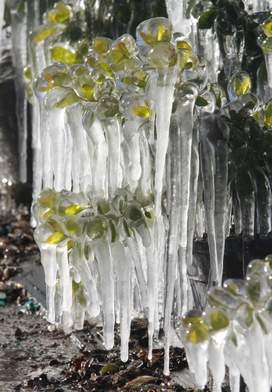 Photo Credit: CALVIN KNIGHT | THE LEDGER
Photo Credit: CALVIN KNIGHT | THE LEDGER
Ice covers a small shrub as a protective coating
at Harrell's Nursery off County line Rd east of
Lakeland, Fl. Sunday morning.
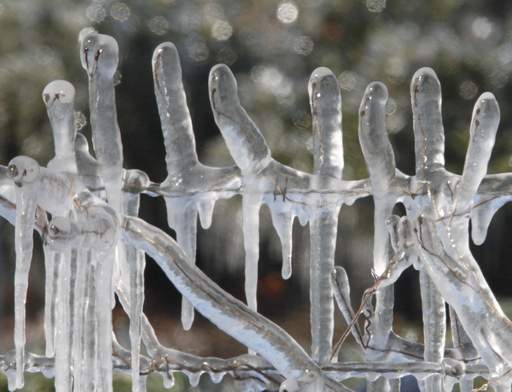 Photo Credit: CALVIN KNIGHT | THE LEDGER
Photo Credit: CALVIN KNIGHT | THE LEDGER
Ice covers weeds growing on a barbed wire fence on a fence off County line Rd east of
Lakeland, Fl. Sunday morning. January 10th 2010.
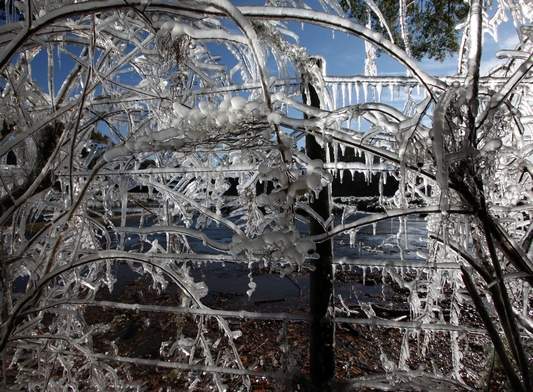 Photo Credit: CALVIN KNIGHT | THE LEDGER
Photo Credit: CALVIN KNIGHT | THE LEDGER
Ice covers a small tree and barbed wire fence boardering a nursery off English Rd east of
Plant City Fl . Sunday morning. Grove and Nursery workers sprayed water over plant to protect
them a covering of ice. With tempatures dropping in the mid twenty's water is sprayed on t
he plants act as a protective barrier keeping the plants at 32 degrees. 


















